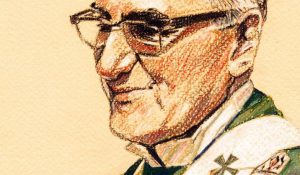Commentary:
By Randy Jurado Ertll

We need to remember Archbishop Oscar Romero thirty-five years after his assassination on March 24, 1980.
Romero’s political evolution took place once he was named to head the Catholic Church in El Salvador.
He was transferred to the capital San Salvador, where he was met with much antagonism and dislike. It was not just Roberto D’Aubuisson (the politician who hatched the conspiracy), the death squads and some members of the Salvadoran elite who murdered him. Many others were complicit, too.
While in the capital, leading the church, he gained incredible spiritual strength to defend the poor and the voiceless. Millions would listen to his homilies on radio.
The people who truly embraced Romero were the poor campesinos who attended his mass and those who had the privilege to get to know him when he would visit their villages. Romero came from a middle-class background but he purposely chose to live a humble life.
Romero was not afraid to die. He was a valiant man who did not accept bodyguards. He consciously chose to give his life for the poor.
But he was very afraid of the demons that were being unleashed upon the Salvadoran populace. He knew much blood would be spilled. He even risked his life by having a dialogue with the guerrilla leaders, asking them to avoid using violence. He tried everything in his power to stop the oncoming bloodbath.
Before his assassination, Romero visited Pope John Paul II, who snubbed Romero. Romero was deliberately made to wait an inordinate amount of time and relegated to a long line to meet the pope. The pope chastised Romero and ordered him to stop speaking up for the rights of the poor and involving himself in political issues.
Romero returned heartbroken to El Salvador. But he still continued to denounce the regime’s human rights abuses and killings. He made up his mind that he would give his life for the persecuted Salvadoran people, even if the Vatican refused to acknowledge the atrocities.
Ironically, the same church that turned its back on Romero is all set to venerate him. The Catholic Church formally beatified Romero on May 23 in San Salvador, one step short of sainthood.
Even if not a saint, Romero did actually conduct countless miracles. He saved the lives of numerous people who would otherwise have been tortured and killed. He sheltered and protected innocent victims in his churches.
He fed the poor, clothed them, and he spoke up for them, knowing that he would possibly be killed. In fact, the miracle is that Romero has been now recognized as an international hero by the Catholic Church, when before he was demonized by many of his fellow clergy. Finally, the church is atoning for its sins toward him.
Romero taught us all an invaluable lesson: He stood up to bullies and he did not turn his back on his people.
Archbishop Romero was a hero and martyr. We honor him on his assassination anniversary by remembering all the good that he did.
Randy Jurado Ertll is the author of Hope in Times of Darkness: A Salvadoran American Experience. He can be reached at pmproj @progressive.org. Reprinted from The Progressive: http://www.progressive.org/